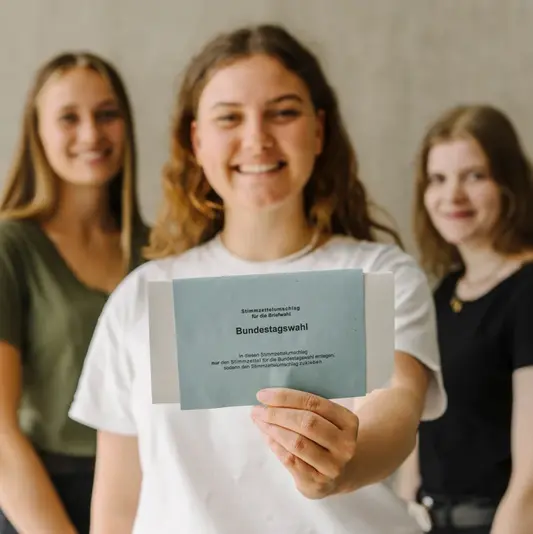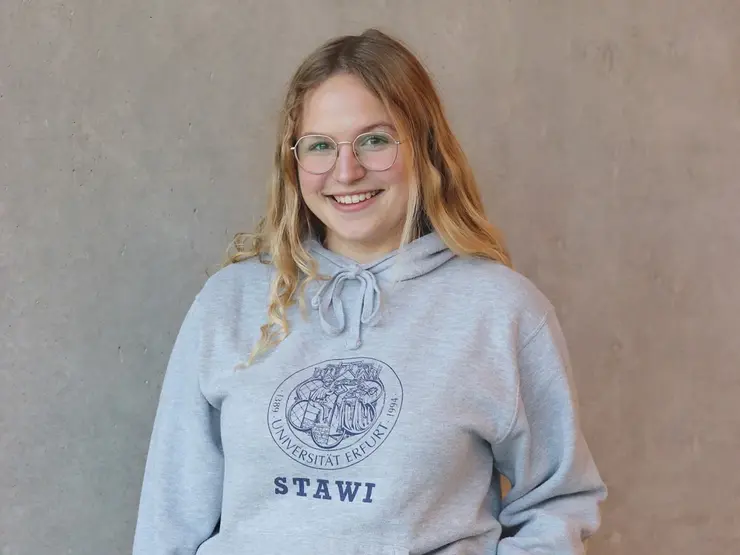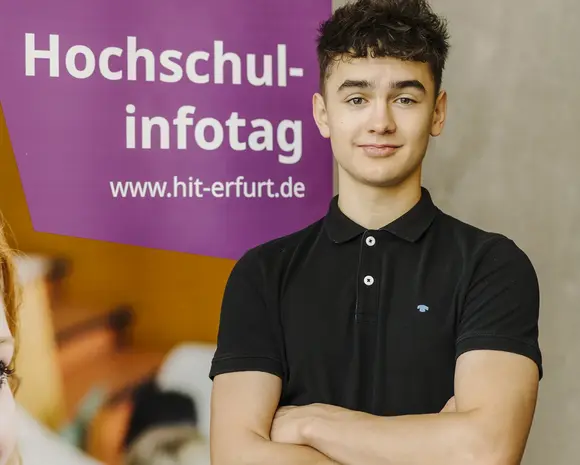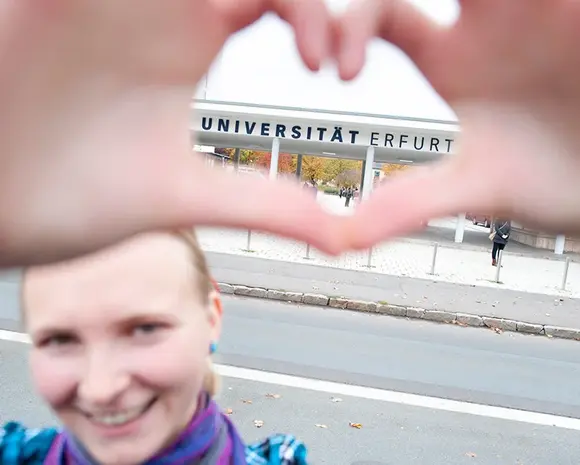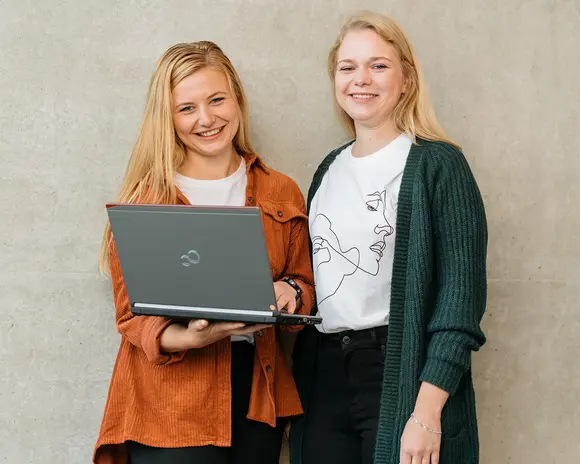The increasing global interdependence of politics, law, economics and culture is one of the greatest challenges of our time. Interdisciplinary knowledge, as conveyed in the Faculty of Economics, Law and Social Sciences at the University of Erfurt, is therefore becoming increasingly important.
- Law,
- Social Sciences (Political Science & Sociology),
- Economics.
Law
In the study of Law, you will acquire and deepen your knowledge of German and European law and its international implications and learn to apply this knowledge in areas relevant to political science. To this end, the programme provides solid legal knowledge as well as the political, social and economic foundations of law together with the ability to reflect on them theoretically. After completing your studies, you will be able to analyse issues and cases from a legal perspective, shape future of legal frameworks, and contribute to the further development of the law.
Social Sciences
In the study of Social Sciences, with its sub-fields of political science and sociology, you will deepen your understanding of social structures, institutions, and organisations. The Social Sciences explain how political and social systems are created, maintained, and transformed, particularly, how collectively binding decisions are made. In exploring these relationships, the discipline, they emphasizes historical, international, and cultural comparison. The strong focus on qualitative and quantitative methodological training underlines the role of the social sciences as empirical disciplines.
Economics Science
In the study of Economics, you will analyse economic processes from different theoretical perspectives. You will examine organisations and households as actors that shape market processes, which in turn generate intended and unintended consequences through economic action. From different perspectives, you will deepen your understanding of how decentralized markets function. You will also explore empirically how private and public organisations operate, evolve influence the economic development. A central aspect is the study of the possibilities and limits of correcting undesirable outcomes through institutional regulations and policy interventions.
Flyer "Studying Economics, Law and Social Sciences at the University of Erfurt" (pdf, in German)
Our graduates in policy-related fields work, for example:
- in public or private international organisations,
- in international and supranational institutions,
- in national/federal governments,
- in non-governmental organisations (NGOs),
- in development cooperation,
- in public and municipal administration,
- in political and economic consultancy,
- in political youth and adult education,
- in peace and security policy,
- in management consultancy,
- in media and journalism,
- in public relations work (e.g. political parties, associations and foundations),
- in social science research (e.g. market and opinion research).
Our law graduates work, for example:
- in legal advice to companies and associations,
- in public administration,
- in national and international non-governmental organisations (NGOs),
- in legal research,
- in the management of private companies,
- in public relations and politics.
Our economic graduates work, for example:
- in the private-sector and public management,
- in the banking and insurance sectors,
- in industry and service-providing companies of all kinds,
- in market research, opinion research and trend research,
- in empirical economic research,
- in associations and trade unions,
- in national and international non-governmental organisations (NGOs),
- in public institutions,
- in political parties and the public administration.
How is the Bachelor's programme structured?
The Bachelor's degree programmes at the University of Erfurt comprise a major subject and a minor subject. You can combine subjects of the Faculty of Economics, Law and Social Sciences or combine your major subject with a minor subject offered by another faculty at the University of Erfurt. Try out your desired combination with our online tool "Studimat":
A special component of the main subject is the Studium Fundamentale, in which provides students with key competences through interdisciplinary courses and professionally oriented practical experience. After three years, you will attain your first academic degree with the Bachelor's degree which can serve as an entry into professional practice.
All degree programmes are modular. Modules are made up of sub-modules. Within these, courses are offered, such as lectures or seminars. During the course of study, each module is completed with a module examination.
The first year in the Bachelor's degree programme is called the orientation phase (O-Phase). In this year, you familiarise yourself with the university and examination system, get to know the field of study and also prove yourself in it. In the subsequent qualification phase (Q-phase), you will deepen the previous study contents and set your academic focus.
Admission requirements & application
The admission requirement for a Bachelor's degree programme is the general higher education entrance qualification (Abitur) or the subject-specific higher education entrance qualification. Most of the Faculty's degree programmes are open-admission programmes — meaning there is no Numerus Clausus (no admission limit). Applicants can enrol directly in the Bachelor's degree programmes. One exception is the International Relations programme, where admission is restricted due to the limited number of places offered. Therefore, you must first apply for this programme and you may enrol once you are admitted.
Niklas studies at the Faculty of Economics, Law and Social Sciences at the University of Erfurt (in German)
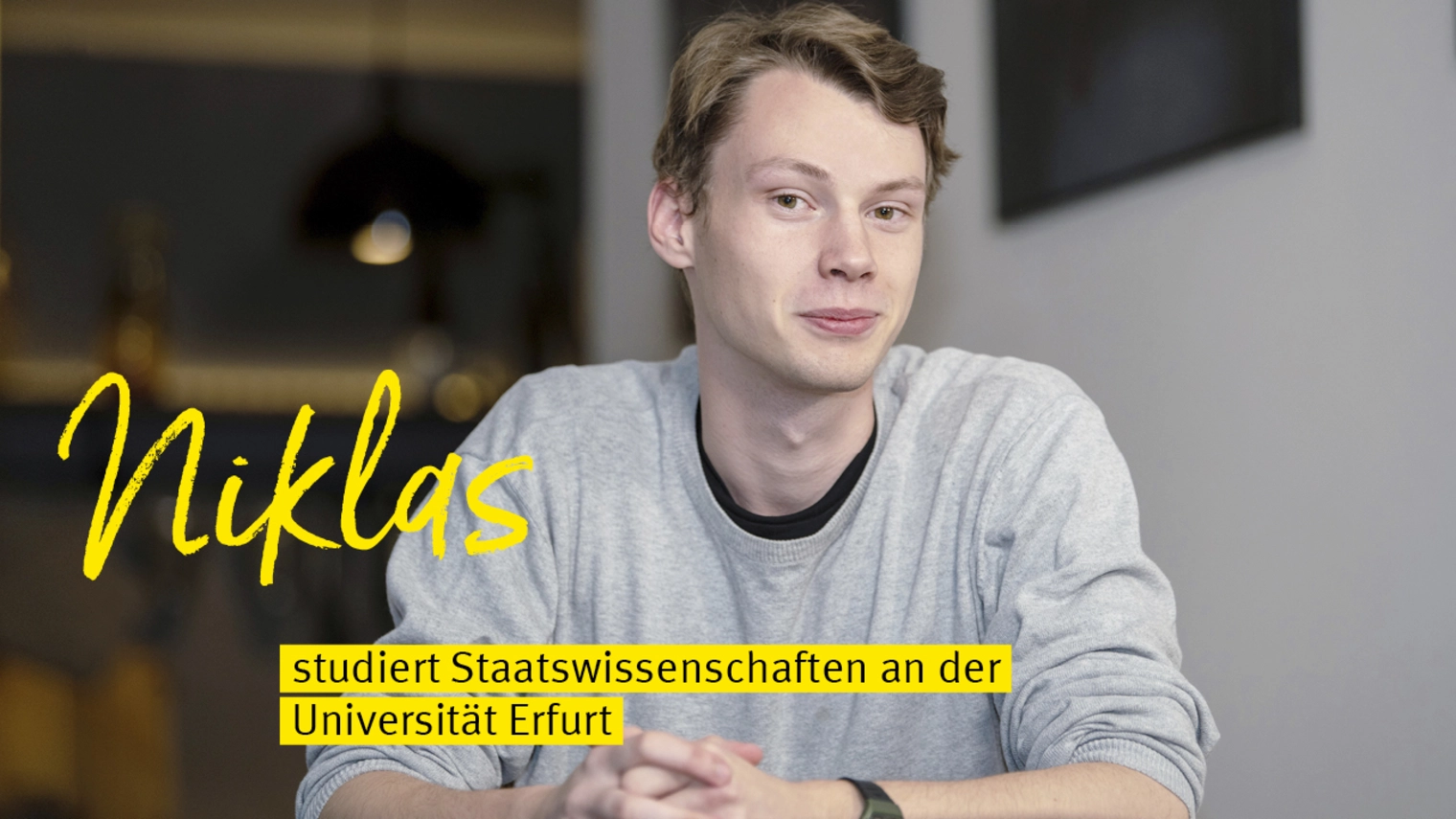
Please note: Once you watch the video, data will be transmitted to Youtube/Google. For more information, see Google Privacy.
How are the Master's programmes structured?
Following the Bachelor's degree, you can choose from several consecutive (postgraduate) Master's programmes. The four-semester standard period of study comprises a three-semester study phase (90 LP/ECTS) and one semester for writing the Master's thesis (30 LP/ECTS). You can find the exact study structure (modules) on the pages of the respective Master's programmes.
Admission requirements & application
The admission requirement for a Master's degree programme is an above-average Bachelor's degree in a field related to political science. You can find the degree-specific requirements on the websites of the respective programmes.
Internship or study abroad
You can also take advantage of the University of Erfurt's numerous partnerships with foreign partner universities in Europe, the USA, Canada, Mexico, Argentina, Israel, Japan or China to complete an internship or study abroad. The International Office gladly assists you in organising your stay abroad.
Diverse offer of language courses
The Language Centre offers numerous language courses in modern and ancient (foreign) languages and is an ideal partner for learning new languages or improving your existing skills.
I studied "Stawi" because...
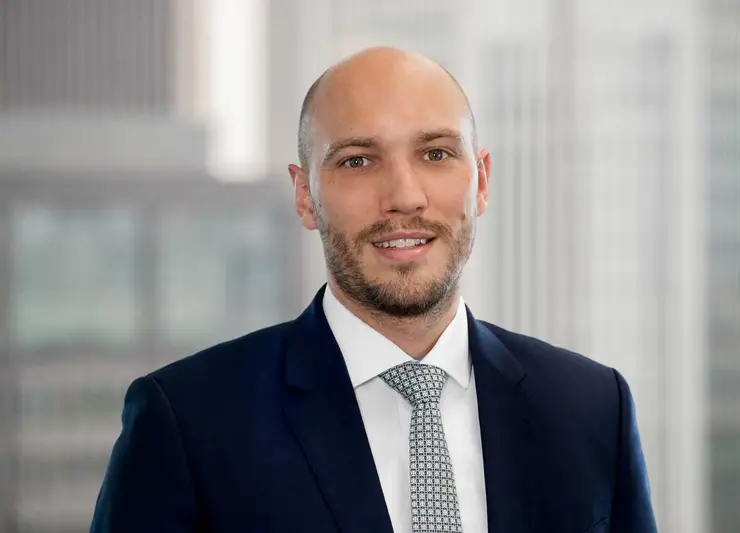
... the interdisciplinary nature of the degree programme prepared me particularly well for my current job in business development at a large commercial law firm. As a result, I can quickly familiarise myself with different fields of work and topics and confidently apply my knowledge from my studies.
- No admission limit (no Numerus Clausus, except International Relations)
- Excellent support from the beginning: a great start to your studies with Student Orientation Days
- Interdisciplinarity: combination of politics, law, economics and sociology
- International exchange programmes for study and internships abroad
- Hands-on diplomacy: Model United Nations (MUN) student project
- Active political engagement: involvement in student and political organisations
- Successful graduates: a strong foundation for an excellent career
Financing your studies: BAföG & Co.
Even though there are no general tuition fees at the University of Erfurt, students should expect expenses for rent, study materials, insurance, and living costs.
You can find an overview of options for financing your studies, such as BAföG or scholarships, on our website.
Affordable living & housing in Erfurt
The cost of living in Erfurt is relatively low compared to other cities. A nice room, healthy food, and leisure activities such as visiting cinemas or bars are affordable even on a student budget. You can use your semester ticket to travel free of charge on tram or regional train throughout Thuringia and visit Erfurt's museums.
Tip: You can apply for a place in a hall of residence as early as April at the Studierendenwerk Thüringen.
University city Erfurt
From the campus you can get to the old town in ten minutes by tram or bike. It is one of the most beautiful medieval city centres in Germany. As the capital of Thuringia with around 200,000 inhabitants, Erfurt is a modern city with historical flair.
Student life in cosy cafés, pubs and clubs, an opera house as well as parks, museums and galleries creates a vibrant and diverse cultural atmosphere.
Engagement & University Sports
Studying is a great opportunity to get involved in various committees and interest groups such as the Student Council (StuRa) or the student councils, or to take advantage of the university sports facilities. With more than 150 courses in over 80 sports, the University Sports Association Erfurt (USV) offers a diverse range of activities for all interests and skill levels.
Studying at the University of Erfurt - on the road with Nathalie and Pauline (in German)
![[Translate to English:] Vorschaubild Studieren an der UE [Translate to English:] Vorschaubild Studieren an der UE](/fileadmin/_processed_/4/0/csm_Thumbnails-Studieren-Uni-Erfurt_01_c8311da7fa.webp)
Please note: Once you watch the video, data will be transmitted to Youtube/Google. For more information, see Google Privacy.
![[Translate to English:] Studierende mit BGB [Translate to English:] Studierende mit BGB](/fileadmin/_processed_/f/e/csm_studierende-rechtswissenschaft-uni-erfurt-02_9c0048f061.webp)
![[Translate to English:] Studierende auf dem Campus [Translate to English:] Studierende auf dem Campus](/fileadmin/_processed_/d/5/csm_Studierende-Campus-Uni-Erfurt-06_b82cfb8650.webp)
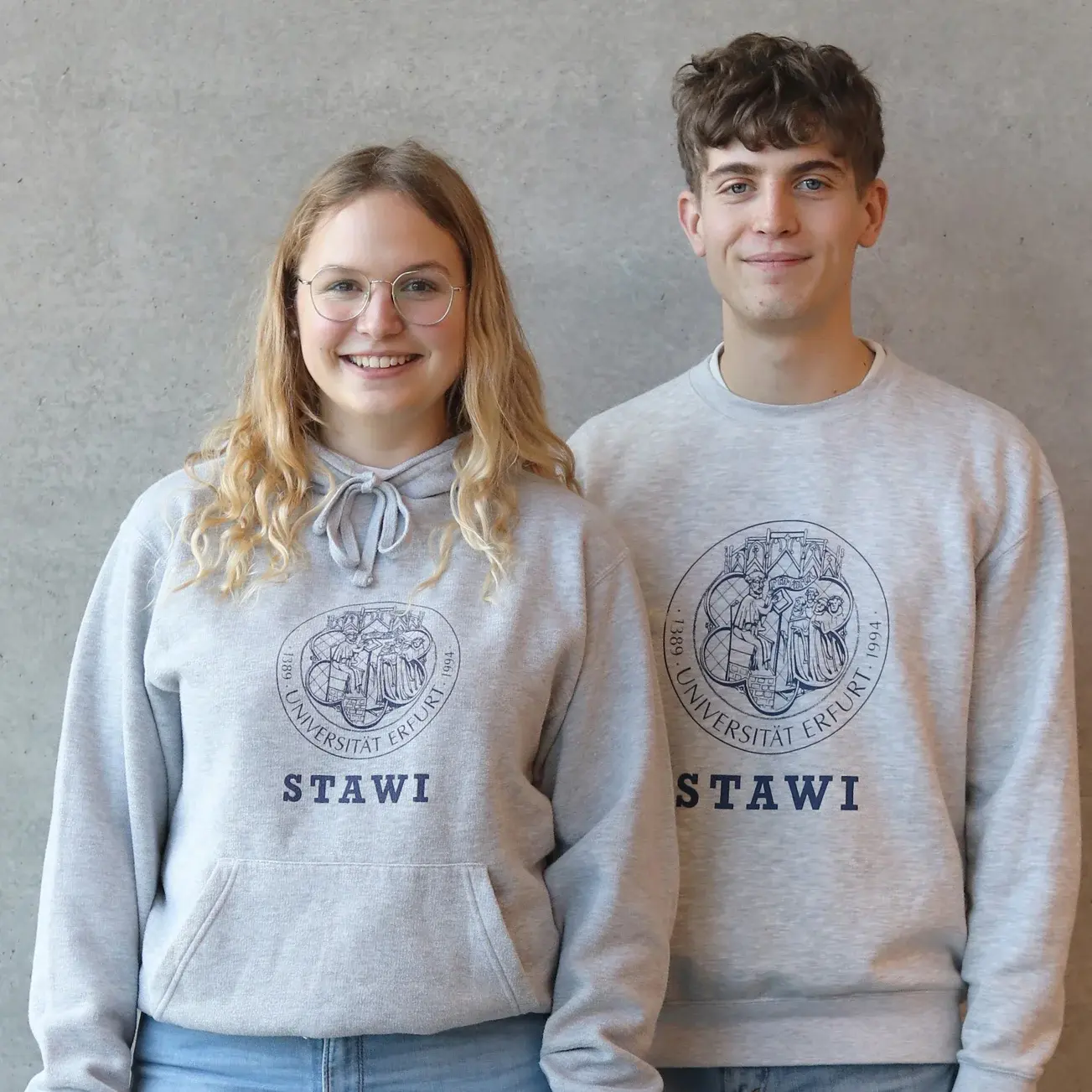









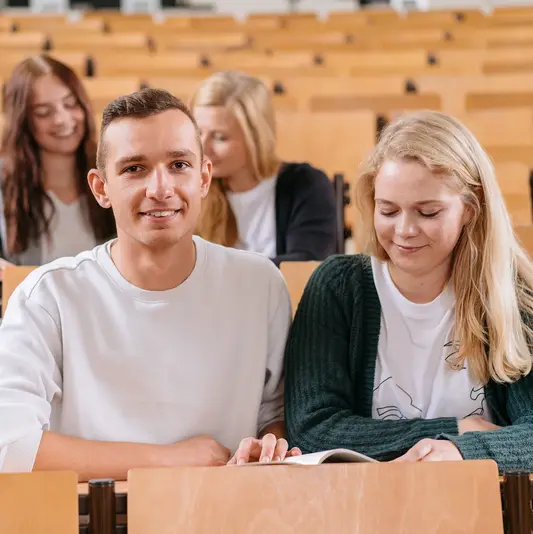
![[Translate to English:] Internationale Beziehungen [Translate to English:] Internationale Beziehungen mit Globus](/fileadmin/_processed_/2/6/csm_Studierende-Globus-Uni-Erfurt-01_9356fa386e.webp)
